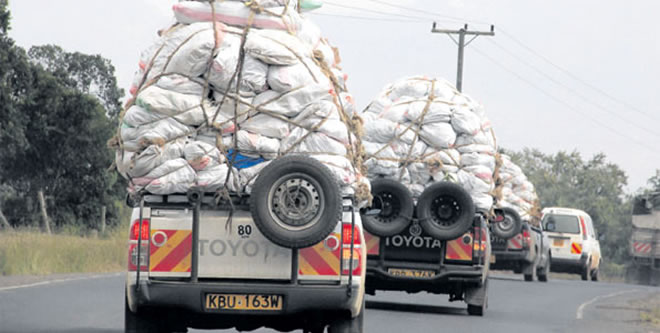
Miraa being ferried from Meru to Nairobi for sale.
Hiiraan Online
By Samira Sawlani
Tuesday, July 09, 2013
www.twitter.com/samirasawlani
Following on from 2012 when the Dutch Government announced a ban on the herbal stimulant ‘Khat’ or ‘Miraa’ as it is often known, the UK has also followed suit, leaving the livelihoods of Kenyan farmers in serious jeopardy.
It is believed that the herbal stimulant was historically devoured by the Meru community before going on to gain popularity in neighbouring states including Ethiopia and Somalia.
The growth of the Somalia Diaspora led to an increased demand for Khat across the USA and Europe. Over time many countries, including the USA have gone on to ban the substance, however its popularity, particularly in the UK has meant the industry in Kenya has gone from strength to strength.
Figures suggest that the khat industry in Kenya is worth approximately £80million and has led to the employment of over 500,000 farmers and dealers. Only 20% of produce is consumed within the country, meaning that 80% of the income generated from it is dependent upon exports. According to the British Home Office, aside from Somalia, Britain is the world’s second largest importer of Khat. In 2011 almost 3000 tons, valued at £13.8 million entered the country from Kenya.
Despite its popularity, it will now be treated as a Class C drug and anyone caught trafficking or supplying it will face up to 14 years in prison. The official statement released by the British Home Secretary Theresa May reads ‘The government will control khat under the Misuse of Drugs Act 1971 as a Class C drug. The whole of northern Europe and the majority of other EU member states have controlled khat, as well as most of the G8 countries, including Canada and the USA. In all these cases khat’s exportation, importation, supply and its possession or use has been banned. Failure to take decisive action and change the UK’s legislative position on khat would place the UK at a serious risk of becoming a single, regional hub for the illegal onward trafficking of khat to these countries. Khat continues to feature prominently amongst the health and social harms, such as low attainment and family breakdown, cited by affected communities and the police and local authorities working with them.’
The leafy substance, which is chewed is said to give a mild intoxicating high and has addictive properties. Indeed, a large amount of the Somali population is the first to say that it had contributed largely to the breakdown of society both inside and outside of Somalia.
Abukar Awale has worked tireless in the UK to campaign for the ban, a former Khat addict he speaks about the negative affect the drug is having on families, the wider community and most worryingly Somali youth in the Diaspora. It is well known that both inside and outside of Somalia a large number of Somali men spend all their time and money in Khat chewing rooms known as Mafrish. This leaves them unemployed and unable to earn, which in turn leads to conflict within the home and in many cases results in divorced couples and broken families.
The various arguments put forward to justify a ban on the product in the UK and elsewhere, it is easy to forget the impact this will have not only upon the Kenyan economy in general, but on those individuals and communities who depend upon Khat exports to survive.
At a Khat house in London sits Idris Alawi, a Kenyan born shop owner who has been selling Khat along with food and drink items from East and Horn of Africa for over 10 years. “My business will suffer severely because of this ban, Khat chewers are what keep me afloat. Then I think it’s ok, I will survive, people come and buy fruits and vegetables for me, but what about my Kenyan brothers and sisters in Meru? In Meru North alone almost ksh100million comes in due to the growth of the Miraa. The amount of it exported to London generates for Kenyans over ksh12million”
A gentleman sat at the shop chewing interrupts “It is true, really we will suffer without it, chewing makes me feel so alert, but the Kenyans will suffer most, it is typical of the International governments to do this.”
In previous years the International media have reported on concerns that the international khat trade has funded terrorist groups like Al Shabaab and that this may be part of the reason for the imposed ban.
Regardless of the reasons, the ban will surely cause worries for Khat farmers in Kenya, particularly in parts of the country where the local economy will be crippled due to its dependence upon Khat production and exportation.
It waits to be seen whether the Kenyan government will enter discussions with the British Government in order to reverse the ban as they had done with Dutch authorities. It is ironic that a stimulant which some need to chew everyday for survival, is actually the only means of survival for others.